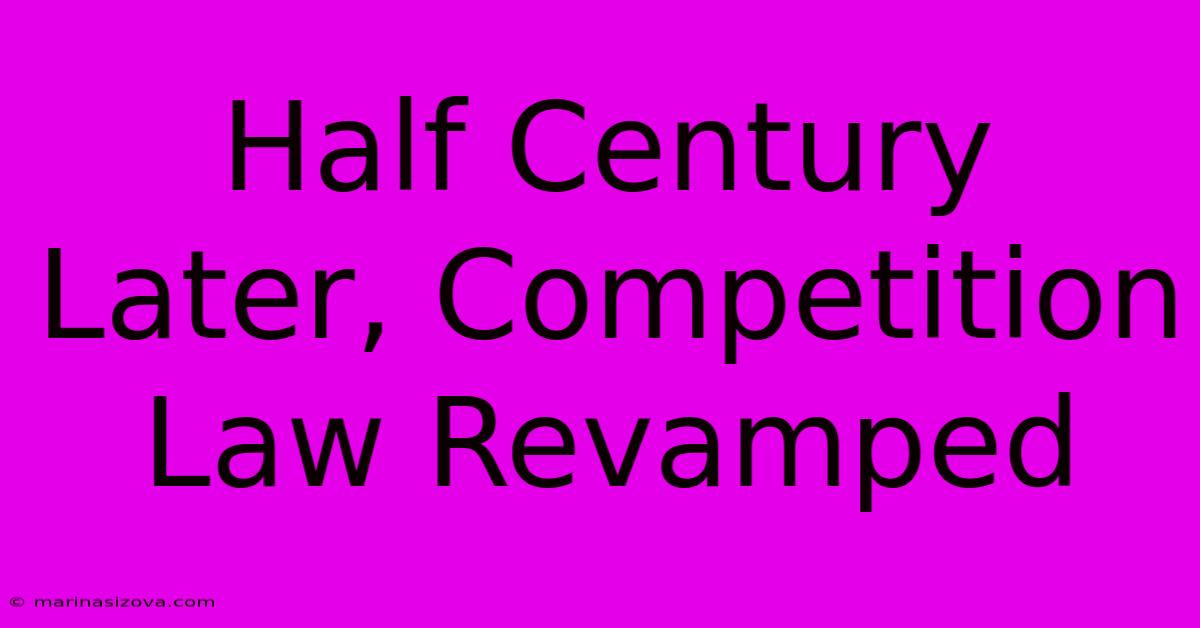Half Century Later, Competition Law Revamped

Discover more detailed and exciting information on our website. Click the link below to start your adventure: Visit Best Website. Don't miss out!
Table of Contents
Half Century Later, Competition Law Revamped: A New Era of Market Regulation
The landscape of competition law has undergone a dramatic transformation in recent decades, reflecting the rapid evolution of global markets and the increasing influence of digital giants. As we mark the 50th anniversary of the foundational principles of competition law, it's clear that a new era of regulation is upon us, one that addresses the complexities of modern markets and ensures fair competition for all players.
A Half-Century of Progress: From Monopolies to Digital Dominance
The roots of modern competition law can be traced back to the late 19th century, when concerns about the rise of monopolies and trusts led to the creation of landmark legislation like the Sherman Antitrust Act in the United States. Over the past 50 years, the focus of competition law has shifted from combating traditional cartels and mergers to addressing the challenges posed by the rise of digital platforms.
The internet revolution has ushered in a new era of competition, marked by:
- The dominance of large digital platforms: Companies like Google, Amazon, Facebook, and Apple wield immense market power, controlling vast troves of data and shaping online experiences.
- Data-driven strategies: The ability to collect and analyze vast amounts of data allows these companies to gain insights into consumer behavior and tailor products and services, creating a competitive advantage.
- Network effects: The value of these platforms increases with the number of users, making it difficult for new entrants to gain traction and creating barriers to entry.
Revamped Competition Law: A Response to Modern Market Dynamics
The traditional competition law framework, designed for an analog world, is ill-equipped to deal with the intricacies of digital markets. Governments around the world are recognizing this need and taking steps to revamp competition law, focusing on:
1. Addressing Digital Market Power:
- Targeted interventions: Regulatory authorities are developing new rules specifically for digital platforms, aimed at curbing anti-competitive practices like data collection and algorithmic discrimination.
- Increased scrutiny of mergers and acquisitions: Regulators are scrutinizing acquisitions by large digital companies more closely, particularly when they threaten to stifle competition in nascent industries.
- Data protection and privacy: Strengthening data protection regulations and promoting data portability gives users greater control over their data, limiting the ability of dominant platforms to exploit it.
2. Promoting Innovation and Fairness:
- Encouraging interoperability: Promoting interoperability between platforms allows users to seamlessly switch between different services, reducing the lock-in effect and fostering competition.
- Open access to data: Requiring large platforms to share data with competitors can level the playing field and promote innovation, particularly in areas like AI and machine learning.
- Preserving consumer choice: Regulators are exploring ways to protect consumer choice by promoting transparency and promoting competition in advertising and search results.
Navigating the Future of Competition Law: Challenges and Opportunities
The ongoing evolution of competition law presents both challenges and opportunities.
- Challenges: Striking the right balance between promoting innovation and protecting consumers while avoiding stifling competition is a delicate task. Adapting to the rapid pace of technological change and ensuring effective enforcement of new regulations are key challenges.
- Opportunities: The revamped competition law framework can foster a more level playing field, promoting innovation and ensuring that consumers benefit from a wider array of choices and services. It can also help to prevent the emergence of monopolies and promote healthy market competition.
Conclusion: A New Era of Competition
As the digital economy continues to evolve, competition law must continue to adapt to ensure a fair and competitive market. By tackling the unique challenges of the digital age, we can create a more equitable and dynamic economy that benefits all stakeholders. The 50th anniversary of competition law marks a turning point, a moment to acknowledge the need for constant evolution and innovation to ensure a truly competitive and consumer-centric marketplace for the future.

Thank you for visiting our website wich cover about Half Century Later, Competition Law Revamped. We hope the information provided has been useful to you. Feel free to contact us if you have any questions or need further assistance. See you next time and dont miss to bookmark.
Featured Posts
-
Zdroje Smiertelny Wypadek Dwie Osoby Zginely
Oct 29, 2024
-
Maja Hyzy Oficjalne Oswiadczenie O Rozstaniu
Oct 29, 2024
-
Despidos En La Segunda Division Cuatro Tecnicos Fuera En Un Mes Y Medio
Oct 29, 2024
-
Cuidado Com A Sextorsao Proteja Se No Instagram
Oct 29, 2024
-
Cierre De Fabricas De Volkswagen En Alemania
Oct 29, 2024
